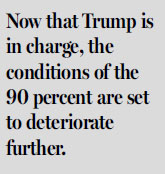Blame the privileged for the anger in US
Many blame today's populist rebellion in the West on the far right, which has won votes by claiming to be responding to working-class grievances, while stoking fear and promoting polarization. But, in blaming leaders who have seized on popular anger, many overlook the power of that anger itself, which is aimed at elites whose wealth has skyrocketed in the past 30 years, while that of the middle-and lower-income groups has remained stagnant.
Two recent analyses get to the heart of the issues at play, particularly in the United States, but also in the rest of the world. In his new book Tailspin, journalist Steven Brill argues that US institutions are no longer fit for purpose, because they protect only a few and leave the rest vulnerable to predatory behavior in the name of free market. According to Brill, this is an upshot of the US' meritocracy: the best and brightest had the chance to climb to the top, but then essentially pulled the ladder up behind them, as they captured democratic institutions and used them to entrench special privileges for themselves.

Author Matthew Stewart agrees, arguing that, "the meritocratic class has mastered the old trick of consolidating wealth and passing privilege along at the expense of other people's children". Stewart shows that in the mid-1980s, the share of US wealth held by the bottom 90 percent of the population peaked at 35 percent; three decades later, they owned just 20 percent, with almost all of what they lost going to the top 0.1 percent. The 9.9 percent between these two groups - what Stewart calls the "new American aristocracy" - comprises what used to be called the middle class. In 1963, the 90 percent needed to increase their wealth sixfold to reach the level of the 9.9 percent; by the 2010s, they needed 25 times their wealth to reach that level.















